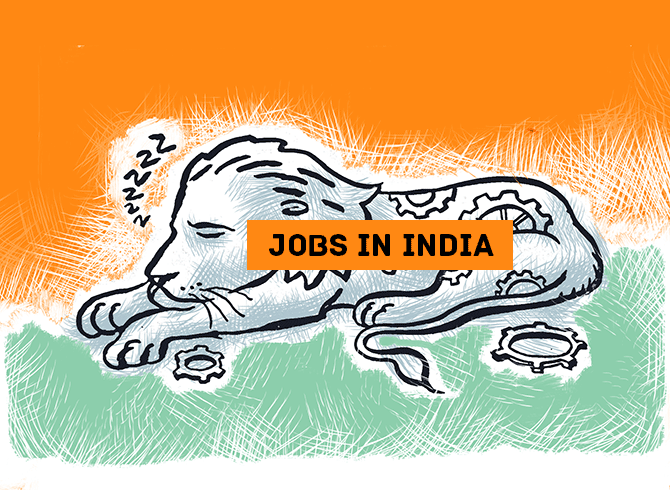A government panel examined the records of employees surveyed by Labour Bureau’s quarterly enterprises surveys and mapped it with EPFO's subscribers and found “unexplained variations” between the two.
Illustration: Dominic Xavier/Rediff.com

A government-appointed panel led by former chief statistician TCA Anant has recommended doing away with the quarterly surveys on jobs provided by the Labour Bureau due to its poor coverage and quality.
Alternatively, it has suggested if substantial improvements in the Labour Bureau’s quarterly enterprises surveys (QES) are made, a first-of-its-kind Employment Index can be formed on the lines of the Index of Industrial Production (IIP) and the Consumer Price Index (CPI).
The idea of an Employment Index was first mooted by Chief Statistician of India Pravin Srivastava to the government in June 2017, when he was the additional director general (employment) in the labour ministry.
The Anant-led technical committee, which submitted its report to Labour and Employment Minister Santosh Kumar Gangwar recently, has said the Labour Bureau’s surveys were incomplete and “should be discontinued henceforth”, according to documents reviewed by Business Standard.
The committee was set up by the government last year, on the recommendations of the Prime Minister’s Office (PMO), after it started releasing monthly payroll data of Employees’ Provident Fund Organisation (EPFO), Employees’ State Insurance Corporation (ESIC), among others to give job estimates.
The committee, which had Srivastava, former chief economic adviser Arvind Subramanian, among others as members, was tasked to suggest whether the quarterly enterprises survey (QES) produced by the Labour Bureau is “relevant in the present circumstances especially after monthly payroll data” and suggest reforms in QES, “if it is to be made relevant.”
The panel said its assessment “raises a number of questions about the quality of data collected under the Labour Bureau’s QES.”
The panel examined the records of employees surveyed by QES and mapped it with the Employees’ Provident Fund Organisation subscribers and found “unexplained variations” between the two.
It noted that the difference could be on account of differences in approaches to data collection, conceptual differences, coverage, completeness and representativeness.
“It is clear that the QES dataset is incomplete and due to coverage and quality issues should not be continued in its present form to generate estimates at the national level. The QES should be discontinued henceforth,” the panel’s report stated.
On the EPFO’s database, the committee was of the view that there is a “wealth of information that can be used more rigorously” if it is categorised statistically using appropriate methods and coding structures of the National Industrial Classification (NIC).
The panel said if substantial improvement is made in collecting, sampling and framing the Labour Bureau’s QES, an Employment Index can be formed.
The panel went a step further by framing a sample index on the basis of the QES reports, in its report submitted to the labour minister.
According to the sample employment index framed by the committee, the growth in employment index stood at 1.65 per cent in October-December 2017, compared to 1.76 per cent in the previous quarter. The employment index grew 1.5 per cent in April-June 2017, as per the panel’s report.
The government had discontinued releasing the Labour Bureau’s QES reports till the time the panel came up with its recommendations.
The last such report, seventh in the series, was released in March 2018 for July-September 2017 quarter.
The field work for the eighth round, between October and December 2017, was complete but its findings were not made public.
A task force to improve employment data in the country, headed by former NITI Aayog vice-chairman Arvind Panagariya, had also pointed out serious flaws in the Labour Bureau’s quarterly surveys but had not recommended doing away with it in its report sent to the government in August 2017.
The quarterly survey of the Labour Bureau was revamped and released in September 2016 to increase its coverage five-fold to 10,000 units.
The Labour Bureau has also discontinued its annual household surveys on employment from 2017-18 as it is being replaced by the National Sample Survey Office’s period labour force survey to be released shortly.
The findings of the survey for 2016-17 are yet to be made public although the report has been approved by Gangwar last month. According to the Labour Bureau’s annual survey, the unemployment rate rose to a four-year high of 3.9 per cent in 2016-17.
In his interviews to various media outlets last year, Prime Minister Narendra Modi had said how lack of jobs data was more serious issue than dearth of jobs itself.










